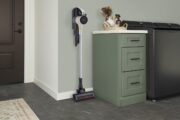(BPT) – Chances are, you’ve been through it — when severe weather hits, there’s nearby construction or just out of the blue, your power suddenly goes out. And you don’t know how long it will last — minutes, hours or days. It’s not just an inconvenience for your family, especially since everyone is spending more time working and schooling from home these days, but it can actually be unsafe. You may need to heat or cool your home so it’s livable, someone in your family may rely on home medical equipment, and you want your refrigerated food to be safe to eat.
Power outages have been increasing due to extreme weather events, plus more people staying home — sometimes causing an overload in energy demands. Being able to cope with unexpected power outages is crucial to your family’s comfort, well-being and safety.
How to be ready for power outages
You may think you’re ready for an outage because you’ve got plenty of flashlights and batteries. Maybe you even have a portable charger for your phone and electronic gadgets. But think about all the items powered by electricity in your home. Even if you have a gas stove, you need electricity to safely ignite it. You rely on your modem to provide internet and even phone connectivity. And the longer the outage lasts, the more you’ve got to worry about.
What your family really needs is safe, reliable backup power.
Choosing a generator for your home
When extreme weather events hit, you don’t want to be one of the many people running to the home improvement store to try to snag the last generator on the shelf. The truth is, you actually have two choices when it comes to generators — a portable model or an automatic standby generator. Either one can help you during an outage, so it’s a good idea to know the difference between the two.
Portable generators
Having a portable generator handy gives you an easy-to-use, low-cost option which offers you some peace of mind in case of a temporary outage. One benefit to portable generators is that they can be used for a variety of outdoor activities like camping and tailgating.
Portable generators supply enough power for a handful of individual products or systems in your home, like your refrigerator or lights. They are manually operated, which means you need to be home to get them started and keep them fueled throughout the power outage.
In addition, to prevent carbon monoxide poisoning, you need to be sure your portable generator is placed at least 20 feet away from your home outdoors, and not inside a garage or screened-in porch. Having a carbon monoxide detector in your home is a highly recommended safeguard.
When using a portable generator, make sure all the systems and appliances you’re backing up from your home are plugged in with properly rated extension cords that run from your home outdoors to the portable generator.
Companies like Kohler offer portable generators in a variety of sizes to meet your power demands. Most portable units run on gasoline, so be sure to keep extra fuel on hand.
Automatic standby generators
For a more permanent solution, you could choose to have an automatic standby generator permanently installed outside your home, similar to a central air conditioning unit. These generators can power everything in your home, and they run on propane or natural gas supplied from your home, with no refueling necessary.
One big advantage of an automatic standby generator is that you do not need to be present to start up and operate the system. When the power goes out, an automatic transfer switch shifts power from the main utility to your generator within seconds — whether you’re home or away.
A Kohler Home Generator delivers high-quality power to your home that won’t harm your sophisticated electronics. Larger units can supply enough power to keep your critical hard-wired systems running, including your HVAC, sump pumps, security systems and large appliances. These generators run quietly and come in a corrosion-resistant housing which prevents rusting. You can also use your smartphone or tablet for remote monitoring of the system.
Want to learn more about protecting your home from the next power outage? Visit KohlerPower.com.


